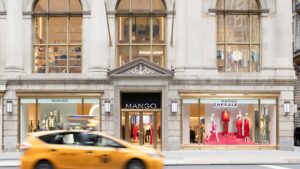Mango’s Bold Leap: Reimagining Retail in the U.S.
At Extreme Investor Network, we closely monitor the strategies of global retailers, and the latest moves from Spanish fashion giant Mango showcase a dynamic shift that sets them apart in the competitive U.S. marketplace. Mango is not merely expanding—it’s redefining its identity as a premium brand while eschewing the fast-fashion label that once defined it. For investors and fashion enthusiasts alike, this is a trend worth following.
Expansion Plans on the Horizon
Mango’s ambitious blueprint involves launching 42 new storefronts in the U.S. by the end of this year, with an additional 20 locations slated for 2025. This growth primarily targets the thriving Sun Belt and the densely populated Northeast regions, areas known for strong retail performance and consumer spending. According to CEO Toni Ruiz, this expansion is more than just a numbers game; it’s about forging a deeper connection with American consumers.
What’s particularly noteworthy is the creation of a new logistics center near Los Angeles, accompanied by the promise of around 600 new jobs. With these additions, Mango’s U.S. workforce is projected to reach about 1,200 employees by next year, demonstrating a commitment to not just growth, but also to local economies.
Moving Beyond Fast Fashion
One of the most exciting aspects of Mango’s strategy is its focus on transforming its brand image. The company has experienced sales growth exceeding 10% in the U.S. and anticipates continuing on this trajectory, aiming to push annual sales from 3.1 billion euros to 4 billion euros by 2026. This signals a deliberate shift away from fast fashion towards a more curated, quality-driven approach.
Mango is taking its cue from its design process, which spans seven to eight months, ensuring quality and originality. Everything—from design to production—is crafted in-house in Barcelona with a dedicated team of 500 professionals overseeing every step. This hands-on approach not only enhances product quality but also reinforces Mango’s commitment to creativity and individual style, resonating with discerning consumers.
Physical Presence Matters
Mango’s approach isn’t limited to online sales; the retailer acknowledges the importance of establishing a physical presence in the market. As Ruiz puts it, having physical stores allows the company to engage with customers intimately and narrate its story effectively. It’s a strategic move, especially as Americans dedicate an average of $2,000 annually on clothing, as per a Lending Tree study.
While competitors like H&M, Zara, and Uniqlo have also made significant inroads, Mango’s unique positioning as a premium brand could carve out a distinct niche. With locations already opened in Pennsylvania, Washington D.C., and Massachusetts, the warm climate and strong consumer behavior in the Sun Belt region could offer a fertile ground for their next growth phase.
Tailoring to a Diverse Market
Perhaps the most intriguing challenge Mango faces is navigating the diversity of the U.S. market. Ruiz noted that “every state in the U.S. is like a country in Europe, each with its own distinct style and shopping preference." This localized approach is critical for success, as Mango looks to tailor its offerings to meet unique regional demands.
With e-commerce contributing about 33% to overall sales, data-driven insights will play a vital role in determining where to open new stores and which products to stock. This level of agility can give Mango a competitive edge as it adapts to the preferences of diverse customer bases across the nation.
Conclusion: A Brand to Watch
As Mango forges ahead with its U.S. expansion, it exemplifies the potential for growth in an ever-evolving retail environment. Their strategy of prioritizing quality, a premium brand image, and an intimate understanding of regional markets sets them apart from other retailers. For investors keeping an eye on retail trends, Mango’s reimagining of its marketplace strategy indicates a promising trajectory that could yield significant returns.
At Extreme Investor Network, we’ll continue to track Mango’s progress and share insights that equip you with the knowledge you need to make empowered investment decisions. Stay tuned for more updates on how this intriguing shift unfolds!

